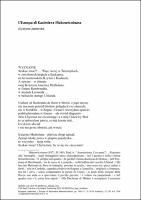Chapter L’Europa di Kazimiera Iłłakowiczówna
| dc.contributor.author | Jaworska, Krystyna | |
| dc.date.accessioned | 2022-09-15T20:06:30Z | |
| dc.date.available | 2022-09-15T20:06:30Z | |
| dc.date.issued | 2019 | |
| dc.identifier | ONIX_20220915_9788864539102_51 | |
| dc.identifier.issn | 2612-7679 | |
| dc.identifier.uri | https://library.oapen.org/handle/20.500.12657/58255 | |
| dc.language | Italian | |
| dc.relation.ispartofseries | Biblioteca di Studi Slavistici | |
| dc.subject.classification | thema EDItEUR::J Society and Social Sciences::JH Sociology and anthropology::JHB Sociology | en_US |
| dc.subject.other | Kazimiera Iłłakowiczówna | |
| dc.subject.other | contemporary Polish poetry | |
| dc.subject.other | ekphrasis | |
| dc.subject.other | intertextuality | |
| dc.subject.other | cultural identity | |
| dc.title | Chapter L’Europa di Kazimiera Iłłakowiczówna | |
| dc.type | chapter | |
| oapen.abstract.otherlanguage | This article explores Kazimiera Iłłakowiczówna’s poem Wyznanie (Admission) in light of the author’s multilingual education and constant movement across national borders. Iłłakowiczówna, who was opposed to nationalism approaches and considered Polish tradition to be of a piece with European culture, translated into Polish several masterpieces from French, English, German, Russian, Romanian, and Hungarian literary traditions. In order to demonstrate the role that different literary traditions and the visual arts played in writings such as Wyznanie, we also investigate Iłłakowiczówna’s paratexts – her memoirs, talks, and letters. | |
| oapen.identifier.doi | 10.36253/978-88-6453-910-2.19 | |
| oapen.relation.isPublishedBy | bf65d21a-78e5-4ba2-983a-dbfa90962870 | |
| oapen.relation.isbn | 9788864539102 | |
| oapen.series.number | 43 | |
| oapen.pages | 9 | |
| oapen.place.publication | Florence |

